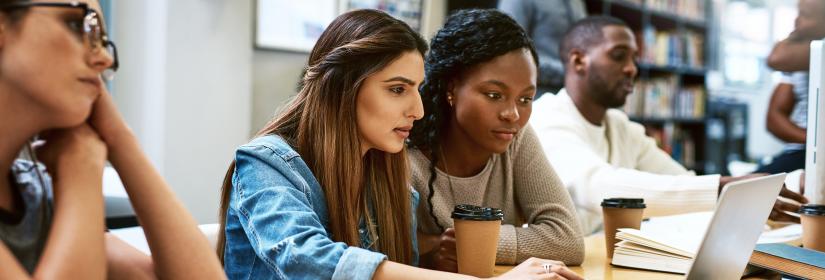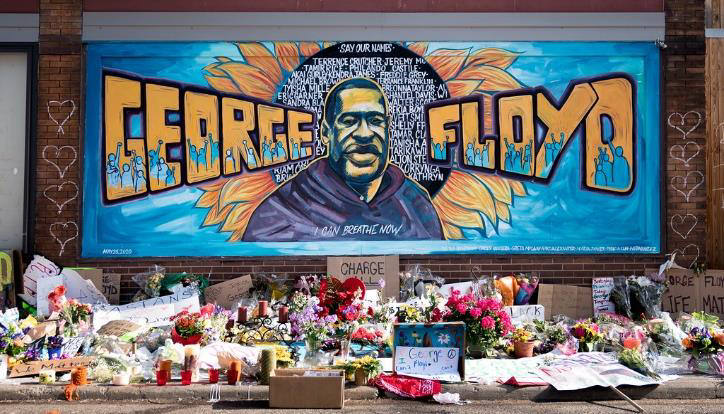01452 894272
Guidance for professionals in Gloucestershire working with young people with mental health or emotional wellbeing concerns
Racism and Mental Health

Fact sheet: Mental health among young people from racialised communities
Young people from racialised communities are exposed to more of the risk factors related to poor mental health, such as racism, school exclusion, poverty, and being in care.
For instance, young people from racialised communities reported feeling less recognised and understood:
-
When talking to their GP about their mental health needs compared to their white counterparts (Annual GP Satisfaction Survey, 2021).
-
Children from racialised communities are less likely than their white peers to access traditional mental health services (Education Policy Institute, 2017). However, they are twice as likely to access mental health support via court orders (social care or criminal justice related orders) (Edbrooke-Childs and Patalay, 2019)

Centre for Mental Health has developed this handy fact sheet with some of the key evidence surrounding the mental health of young people from racialised communities. This work was generously funded by the Shree Kutch Satsang Swaminarayan Temple, Harrow.
Black Lives Matter
Following events reported in the media and the global prominence of the Black Lives Matters campaign, the world has woken up to the devastating impact of racism on individuals, communities and civil society.
Black Lives Matter Assemblies and Lesson Resources
-

-
Embrace Race - Links to diverse and multicultural books for children
-
Educate Against Hate - Lesson plans on equality, diversity, fundamental British values, and more.
Mental Health First Aid England
In July 2021, MHFA England published their Statement of Intent on Race Equity, which outlines the four key action areas and a set of fifteen practical commitments to help them become an anti-racist organisation.
Learning and development, upskills, new guidance and providing new discussion spaces for you are part and parcel of the actions MHFA will take. They will ensure you are supported every step of the way as they build anti-racism into their training.
In response to feedback from People of Colour, and Black Instructor Members expressing concerns both before and after the killing of George Floyd, MHFA are removing the Black Dog video from all of their courses. They have also made BBC Three's short video on depression available: Depression Understood: What It Is Like To Have Depression’. MFHA will continue to share content which can be used in place of the Black Dog video. As a social enterprise, they are committed to put anti-racist principles at the heart of their work and training.
Helpful Resources for Black People and People of Colour
Black Learning Achievement and Mental Health (BLAM)
A community outreach organisation working to share pragmatic solutions to social issues in London through events, projects, and public forums.
Black Thrive
Black Thrive is a partnership between communities, statutory organisations, the voluntary, and private sector working to reduce the inequality and injustices experienced by Black people in mental health services in the London Borough of Lambeth.
Chinese Mental Health Association
Provides a range of culturally appropriate services, including counselling, to Chinese people experiencing mental health or mental health related issues.
Kindred Minds
A user-led project for people from Black and Minority Ethnic (BME) communities living in and around the London Borough of Southwark. Activities are open access with no referral process or cost. Membership is free. Anyone with experience of mental ill health from BME communities are welcome.
Mind
Mind provides advice and support to anyone experiencing a mental health problem, including face-to-face and online peer support. For peer support for specific BAME groups, contact your local Mind or search Mind’s peer support directory.
Young Black Men Programme
A three-year programme launched in 2019 working with 11—30 year olds by offering a range of tailored local services working specifically with young Black men.
Get Help and Support
Equality and Human Rights Commission
Black Minds Matter
- Black Minds Matter website
- Connects Black individuals and families with professional mental health services across the UK;
- Send a message via their website to get connected.
Stop Hate UK
- Stop Hate website
- Confidential and accessible support for victims and witnesses of hate crime;
- Call Hate Out : a 24-hour support service for young people under 18 experiencing or witnessing a hate crime;
- Call 0808 801 0576, or text 07717989025.
The Centre for Race, Education and Decoloniality (CRED)
The Centre for Race, Education and Decoloniality (CRED) was established in 2017. Appointed in November 2019, the Centre is led by Vini Lander, Professor of Race and Education.
CRED was established to undertake research related to race and racism in education. In collaboration with academic and educational professionals the Centre aims to challenge everyday racism and structural race inequalities in education through research, evidence-based practice and the professional development of pre-service and in-service teachers nationally and internationally.
Our academic and professional research enables us to understand the experiences of people of colour, including children, young people, teachers, education leaders and community groups. Through our research we seek to inform education policy change, to decolonise and transform curricula to reflect the contributions and experiences of people of colour, nationally and internationally - in order to prepare all to live, learn and work in a racially and ethnically diverse world.
The Centre seeks to work in partnership with education professionals in all sectors from early years through to further education to develop teachers and practitioners to become race equality education activists/advocates - challenging racism in all its forms and developing anti-racist practices, also to decolonise the curriculum and develop colleagues’ knowledge and understanding of race and racism in education. We also work with teachers, children and young people to develop teaching resources to tackle racism in schools and society.
CRED works with international partners to undertake research to advance knowledge and understanding of race and racism, improving professional practice in order to enhance the educational experience of BAME children and young people affirming their racial and ethnic identities and engender a secure sense of belonging.
The Centre for Race, Education and Decoloniality is committed to developing and advancing professionals’ understanding of the race, racism and decoloniality within contemporary society nationally and globally. If you are interested in deepening your understanding about the discourses on race, racism and decoloniality then you may wish to undertake our MA Race Education and Decolonial Thought.
Young Minds - Mental Health Support for Individuals Experiencing Racism or Hate Crime
Being treated differently or unfairly because of our race, skin colour or ethnicity can negatively affect our mental health.
Racism can happen anywhere. It can happen at school, at work, or at home; it can happen online or outside; it can even happen within families and relationships. Sometimes racist abuse is obvious - verbal abuse about the way someone looks, stereotypes about how someone might behave, or physical violence and bullying, for example. Sometimes racism is part of the structures and systems that we live in. And sometimes racism is ‘subtle’ and difficult for other people to notice.
The important thing is how you see the situation and how it makes you feel. We can spend a lot of time wondering whether we have been badly or unfairly treated because of our skin colour, race or ethnicity, or for some other reason, and it’s not always totally clear. This can make us feel confused or even foolish for talking about our experiences, especially if the people we are talking to have never had to ask themselves these sorts of questions.
Sometimes, even when we are convinced we have experienced racist treatment, people around us might try to tell us we’ve got it wrong. This can feel very lonely and isolating. But remember, you are not alone and your feelings are valid.
It’s also valid if you feel that experiencing racism ‘indirectly’ has an effect on your mental health. Sometimes the things going on around us, to people just like us, can feel like they have happened to us and make us feel personally attacked, helpless, or like our lives don’t matter.
You might also be affected by:
-
Racism directed towards your family and loved ones;
-
Constant negative headlines about a group you identify with or a country you have ties with;
-
Misrepresentation or no representation in the media;
-
Noticing worrying patterns of behaviour from the institutions you interact with (whether at your doctor’s surgery, at school, at work);
-
Reading statistics that show unfairness and inequality across the justice, health and education system;
-
People dismissing how we feel, telling us we’re overreacting, or denying there is a problem.
Our experiences of being treated differently from others because of our skin colour, race or ethnicity can mean that we live with constant fear or anxiety. We might start to avoid doing the same things that other people simply do without thinking about. Some examples of this can include:
-
Speaking in another language, or with an accent, in public;
-
Using public transport or going to certain public places alone where you could be a minority;
-
Using your real name on a job application;
-
Worrying about interacting with the police;
-
Worrying about wearing the clothes we want to wear;
-
Hiding parts of our identity, like our religion or culture;
-
Sharing our worldview and taking part in topical discussions;
-
Visiting places, or going on holiday to places, where racism has been reported.
You might not even be aware that you are doing things like these. If you are constantly making decisions to protect yourself from others, this can affect how you feel. You might find it helpful to think about whether this is something you relate to. By figuring out where our feelings are coming from, it can make them easier to talk about.
It is normal if your experiences of racism – whether big or small, constant or one-off, direct or indirect – affect your self-esteem and/or make you feel angry, depressed or hopeless. It might feel difficult to believe, but things can get better.
Things can change, for you and for society. There are lots of people working hard every day to make a difference so that we can live in a fair and just world. You deserve to feel great about who you are, and to live without fear or prejudice.
If racism is affecting your mental health, there are steps you can take to get the help and support you deserve. Your feelings are valid, and you do not have to go through it alone.
Black History Month Occurs Annually in October.
View resources to explore black history, heritage, culture, and achievements with your class.
Against the Odds
Why is it that young African Caribbean men's mental health is no worse than that of their white peers, but during adulthood they are far more likely to be diagnosed with schizophrenia or to be detained under that Mental Health Act? "Racism is subtle, with people telling you that you can't amount to anything. There is a huge lack of appropriate role models"

